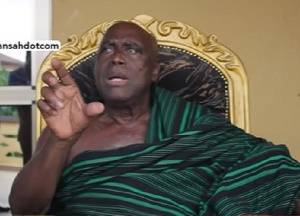Introduction
The 2024 Ghanaian general elections are approaching, and political discussions have gained momentum across the nation. Recently, a statement made by Otumfuo Ahenenananomhene, a prominent traditional leader, has sparked heated debates. He boldly proclaimed that the New Patriotic Party (NPP) would lose the upcoming elections, even if they were to make Jesus Christ their candidate. This assertion has added a new dimension to the political landscape, raising questions about the party's prospects and the role of traditional leaders in shaping electoral outcomes.
The Influence of Traditional Leaders in Ghanaian Politics
In Ghana, traditional leaders have historically held significant influence in their respective communities. These revered figures, known as chiefs or kings, often wield considerable moral authority and command widespread respect among their subjects. Although Ghana is a democratic nation, the influence of traditional leaders can sometimes transcend the political realm.
It is essential to acknowledge that while traditional leaders have a right to express their opinions, they do so as individuals and not as representatives of their traditional institutions. Their statements, while influential, do not necessarily reflect the sentiments of the entire populace. Political decisions in Ghana are ultimately determined by the democratic process and the collective will of the people expressed through the ballot box.
The NPP's Electoral Prospects
The NPP, a major political party in Ghana, has a long-standing history of competing for and holding political power. In recent times, it has been one of the two dominant parties, along with the National Democratic Congress (NDC). In the 2020 elections, the NPP's candidate, Nana Akufo-Addo, was re-elected as President, securing a second term in office.
However, political landscapes are dynamic, and each election presents unique challenges. As the 2024 elections approach, the NPP faces several factors that could impact its electoral prospects:
Incumbency Advantage: As the ruling party, the NPP has the advantage of incumbency, which can boost its campaign efforts and resource allocation. Incumbent parties often have better access to state resources and the ability to showcase their achievements during their time in office.
Economic Performance: Ghana's economic situation will play a crucial role in shaping public sentiment. If the NPP can demonstrate tangible progress in economic growth, job creation, and poverty reduction, it may gain favour with voters.
Internal Party Unity: Political parties need to maintain internal cohesion and unity to project a strong and credible image to the electorate. Any internal divisions or leadership disputes could weaken the NPP's electoral appeal.
Public Perception of Governance: The public's perception of the NPP's governance during its tenure will heavily influence voter behaviour. If the party is perceived as addressing societal issues effectively and transparently, it may garner voter support.
Opposition Dynamics: The performance and strategies of the NPP's main rival, the NDC, will also be crucial. A strong and united opposition can pose a formidable challenge to the NPP's bid for re-election.
The Role of the Electorate
In Ghana's democratic system, the electorate holds the ultimate power to determine election outcomes. Voters have the right to assess each political party's policies, track record, and candidates to make informed decisions at the polls. While traditional leaders' opinions can carry weight, it is the voters who will cast their ballots based on their individual convictions and preferences.
Ghanaian voters are politically astute and often base their choices on a combination of factors, including party ideologies, candidate personalities, and past performance. While the NPP's historical achievements may influence some voters, others may prioritise issues such as social welfare, education, and healthcare in their decision-making process.
In the lead-up to the 2024 elections, both the NPP and the opposition parties must engage in vigorous campaigning and public outreach. It is imperative for the NPP to highlight its achievements during its time in power and articulate a compelling vision for the country's future. On the other hand, the opposition parties, particularly the NDC, will seek to identify areas of weakness in the NPP's governance and present alternative policies that resonate with the electorate.
Otumfuo Ahenenananomhene's statement has sparked discussions not only about the NPP's chances in the elections but also about the role of traditional leaders in the political process. While it is essential to recognise the influence these revered figures hold, it is equally important to uphold the principles of a democratic society, where political decisions are made through free and fair elections. Ghana's democratic institutions and the independence of the Electoral Commission are vital to ensuring a transparent and credible electoral process.
The involvement of traditional leaders in politics has both advantages and drawbacks. On the one hand, their influence can serve as a bridge between the government and the local communities, promoting better governance and development. Their position as custodians of cultural values and traditions can also foster a sense of unity and identity within society. However, on the other hand, there is a risk that their influence may lead to partisan politics within their respective domains, potentially undermining the impartiality of their roles.
To strike a balance, there is a need for ongoing dialogue and collaboration between the government, political parties, and traditional leaders. This collaboration should be based on mutual respect and recognition of each other's roles in Ghana's sociopolitical fabric.
Traditional leaders can offer valuable insights into the needs and aspirations of their communities, which can inform policies and development initiatives. At the same time, political leaders must ensure that their decisions are made in the best interest of the entire nation and not just to appease specific constituencies.
As the election season unfolds, media outlets, civil society organisations, and citizens have an essential role to play in fostering an informed and responsible political environment. Voters must critically evaluate the promises and platforms put forth by political parties, looking beyond mere rhetoric and considering the feasibility and impact of proposed policies.
Transparency in campaign financing is another crucial aspect of ensuring a fair electoral process. Political parties should disclose their sources of funding and be held accountable for adhering to campaign spending regulations. This transparency is essential to promoting a level playing field and preventing undue influence in the electoral process.
In conclusion, the upcoming 2024 elections in Ghana are set to be a significant moment in the nation's democratic journey. Otumfuo Ahenenananomhene's statement has sparked valuable discussions about the NPP's electoral prospects and the role of traditional leaders in politics. As the elections draw near, it is vital for all stakeholders to uphold democratic principles, promote transparency, and engage in constructive dialogue. The Ghanaian electorate holds the power to shape the nation's future through their votes, and their decision will determine the trajectory of Ghana's political landscape for the years to come. Ultimately, the strength of Ghana's democracy lies in its ability to embrace diverse perspectives, foster inclusivity, and ensure that the will of the people prevails.




No comments yet
Be the first to share your thoughts!